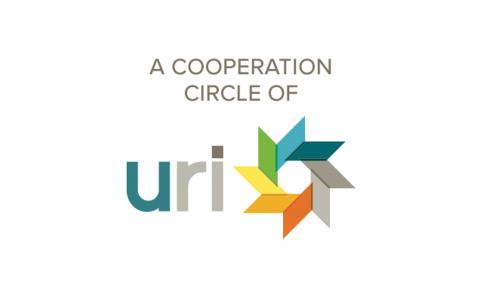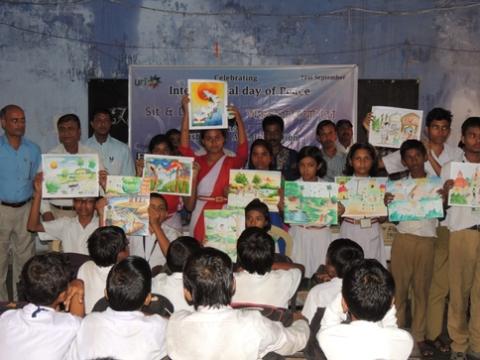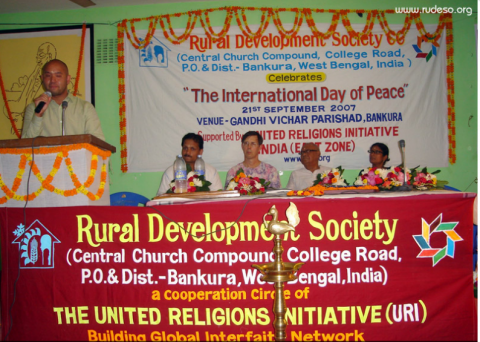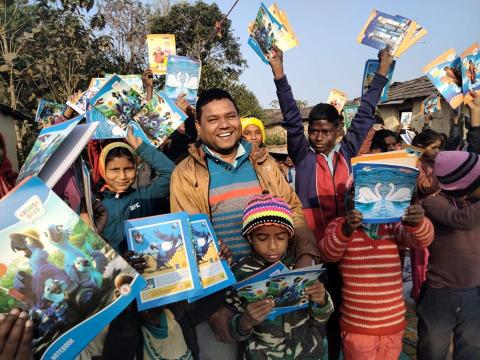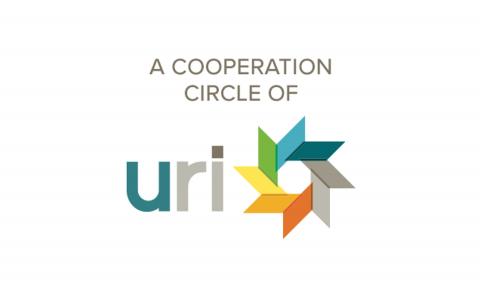To receive help, each family must also give help to a family of a different faith tradition.
Scroll down past the article to see more photos showing a chain of community members passing along understanding and empathy along with charitable donations.
Bridging Boundaries between Faiths with Love and Compassion
A real pearl is not just a gemstone but the culmination of an almost mystical, natural process in the life of an oyster. In response to an irritant, the oyster secretes layer upon layer of pearly substance forming an iridescent gem. In this shining story from URI East India, the irritant is the Covid pandemic. Layer upon layer of compassionate action, given by needy people to needy people, is the life-giving process that is creating societal changes of inestimable value.
“I was always asking myself, how can we really help people in need?"
At a peacebuilding workshop, Biswadeb Chakraborty, Regional Coordinator for URI East India, asked participants, “What would you do if faced with a family in your village in dire need?” One girl, 21 years old, responded, “I would take them a can of sweets and say I will be here for you.” Biswadeb was struck by her compassionate wisdom. He realized that people giving practical goods and genuine care one to another can fill a desperate need and provide healing to both the giver and receiver.
When Covid first hit hard in India, day laborers who worked several train rides from their home villages were let go from their jobs and ordered to return to their homes. Trains were overwhelmed, stranding hundreds of people at the stations. Food concessions were closed. People had to wait days for a train and had no food.
Members of the Interfaith Youth Council, Ektaan, and Rural Development Society (three Cooperation Circles, or URI member groups) saw the immediate need for hot meals to feed hungry people. Their plan was to contract with caterers to prepare hot meals and then they would hand-deliver it to the hungry people. They asked URI East India to help to pay for the food. Funds, previously budgeted for URI meetings cancelled due to Covid, freed up money for this immediate need.
The URI Cooperation Circles returned exhilarated from the deliveries! They knew they were meeting a critical need in offering meals, as well as reaching across the entrenched cultural barriers that separated Hindus, Muslims, and other faiths from each other. They gave hot meals and genuine care.
“Brother, please eat this food prepared for you.”
Muslims registered shock to be graciously offered food from a Hindu, and vice versa. Everyone humbly and gratefully received the food they needed, regardless of differences in faith. It was a beautiful exchange.
Going a step further
Tragically, Covid hit India even harder in 2021. Building on the URI Cooperation Circle initiatives at train stations, the regional team mapped the most affected areas where most people had lost their means of earning a living. The team strategized how to help meet the widespread critical need for food and, in the spirit of URI, how to cross entrenched barriers to build bridges of understanding among people from different religions and castes.
A plan emerged.
The rule was that each family receiving a Grocery Basket had to agree to deliver a Basket to another family from a different faith or caste. The Basket was not a donation, from those “with food” to those “without food” but it was an “earning.” Each person participated in giving and receiving. The intent was to use the terrible disruption of the pandemic to feed hungry people and to build a brotherhood and sisterhood where it didn’t exist before.
Reverend Kalyan Kumar (KK) Kisku, URI Global Council Trustee and a local Christian Tribal leader, envisioned that these interconnecting acts of compassion would be like a string of pearls. The people themselves would be the actors; they would be “up front” reaching out to one another. URI members and the regional team would be “behind the scenes” creating the conditions for the people to step forward.
The gift of giving and receiving across religions and cultural barriers, led by the people themselves, would be "pearls of compassion."
URI Cooperation Circle members in different localities submitted names and addresses of families in dire need because of Covid. Names were supervised by the regional team to be sure that each family met the requirements. Cooperation Circle volunteers organized with local stores to supply the Grocery Baskets. The volunteers explained to each family that in order to receive a Basket, they needed to deliver a Basket to the family whose name and address were provided to them. If the family did not have access to take a photo (to verify and document the exchange), a Cooperation Circle volunteer would accompany the visit. Their only job was to take a photo so the people would speak to each other.
Rather than just dropping off the Basket at the door, the “deliverer” was to engage the receiving family with three questions:
- Please tell me about your family.
- What difficulties you are facing because of Covid?
- How are you helping others cope? What ideas about how to help have come to you?
Photos and stories were sent by volunteers to the URI regional office, where they were strategically posted to media outlets. In addition, proposals to request funds to buy food were submitted to corporations and other community allies.
Local people and corporations gladly donated funds to purchase Grocery Baskets, which allowed the number of exchanges to increase. In the first phase, approximately 100 baskets (each $12 U.S) were delivered. A donation to supply 100 more Baskets is underway! Local media in each area is excited to spread the good news.
One journalist remarked:
"I see it’s the hungry people themselves participating! URI’s work is behind the scenes. Your work allows others to make meaning of these experiences for themselves."
Guided by URI Regional Coordinator Biswadeb Chakraborty, Cooperation Circle members in Nepal have launched a similar program. Members of Peace4Dalits and Youth Society for Peace (two URI member groups) combat intense caste discrimination in Nepal. School teachers have been the first to launch the Grocery Basket program among people of different castes. Initial efforts made news headlines.
The URI East India regional team is co-creating the next steps. Embodying the words in URI’s Preamble, “We provide participation by all people, especially by those whose voices are not often heard,” the team is developing ways where the “poorest of the poor” build up themselves as interfaith bridge builders. The need for food unites. Listening to one another’s struggles and strengths deepens mutual respect and understanding.
The garland keeps growing … as the stories flow, these pearls of compassion shine far and wide.
Story that begins in Bankura District, West Bengal
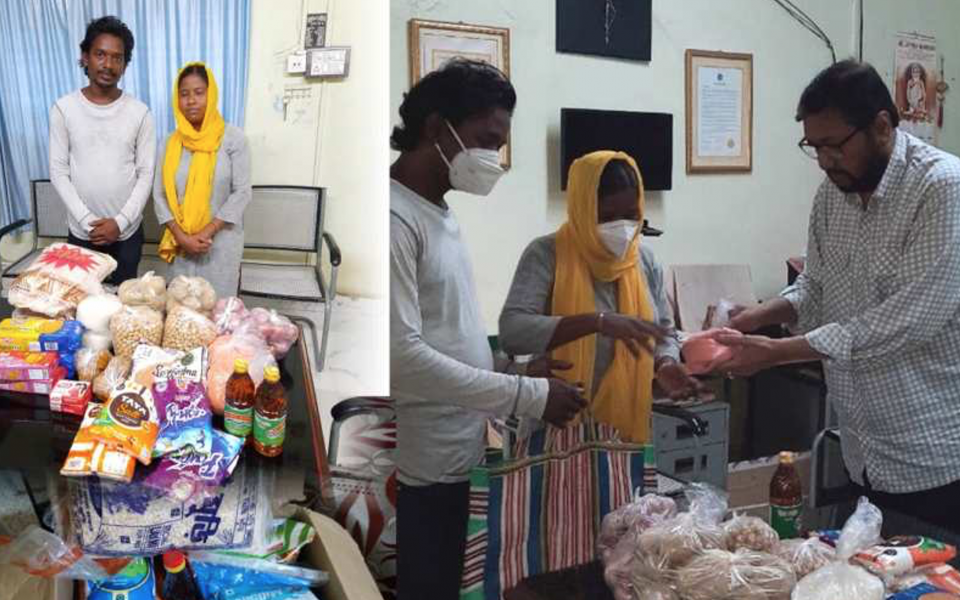
Rural Development Society Cooperation Circle of Bankura coordinates the Grocery Basket delivery. Reverend Kalyan Kumar Kisku, a Christian Tribal leader and URI Global Council Trustee, delivers a Grocery Basket to a Muslim family, Sheik Munna and his wife, Sakina. Due to Covid lockdown, Munna lost his job as a daily wage laborer. In addition, three in his family were very sick with Covid.
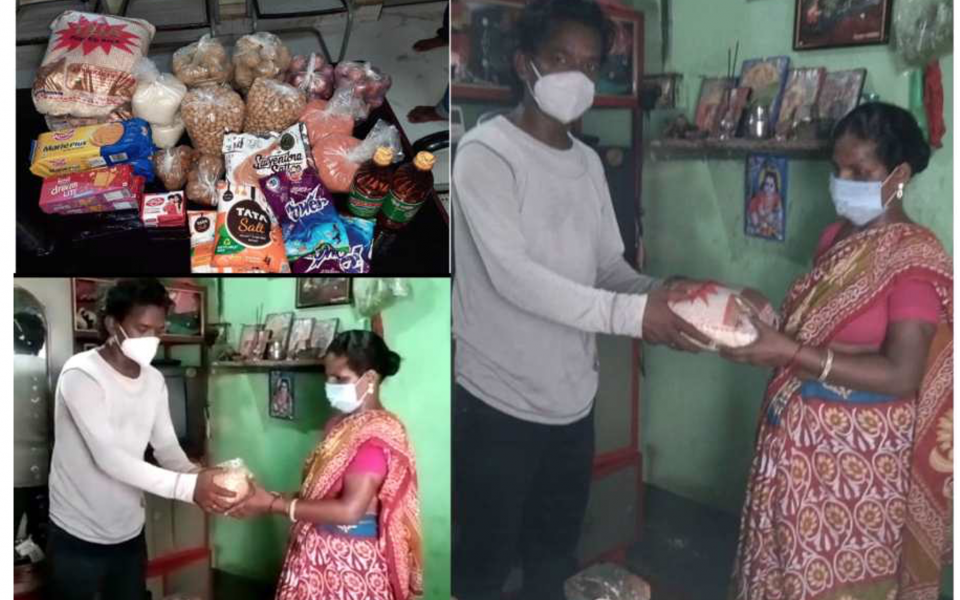
Munna delivered a Basket (and shares his story) with a Hindu Dalit family, Manju Malakar and her husband. Munna learned that Manju works as a maidservant in private homes and had lost her jobs due to Covid. Manju’s husband, a manual rickshaw puller, also became jobless due to Covid. They then delivered a Basket to a Tribal family.
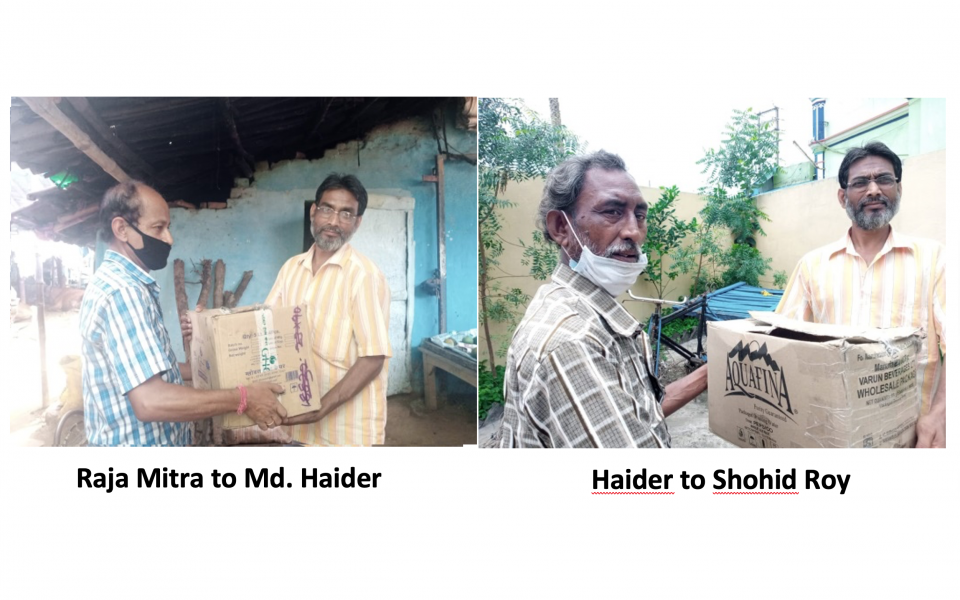
Raja Mitra, a Hindu, delivered a Grocery Basket to a Muslim brother, Mohammad Haider Ali. Mr. Haider had worked for seven years as a clerk for a local educational society but had lost his job due to Covid. With a family of seven to support, Mr. Haider was happy to receive the Basket.
Words from Raja Mitra: “I had never been to the home of a Muslim family. I was uncomfortable to go at first. When I talked to the family, I knew they were good. Mr. Haider he told me he lost his job at the education office. He has a big family to support. I felt very bad for him."
Mr. Haider took a Basket to Mr. Shohid Roy and his family. Mr. Shohid, a Hindu day laborer, supported a family of six. He could find no work during Covid and had also broken his leg. The groceries meant a lot!
“It was the first time I received anything from a person from a different faith.”
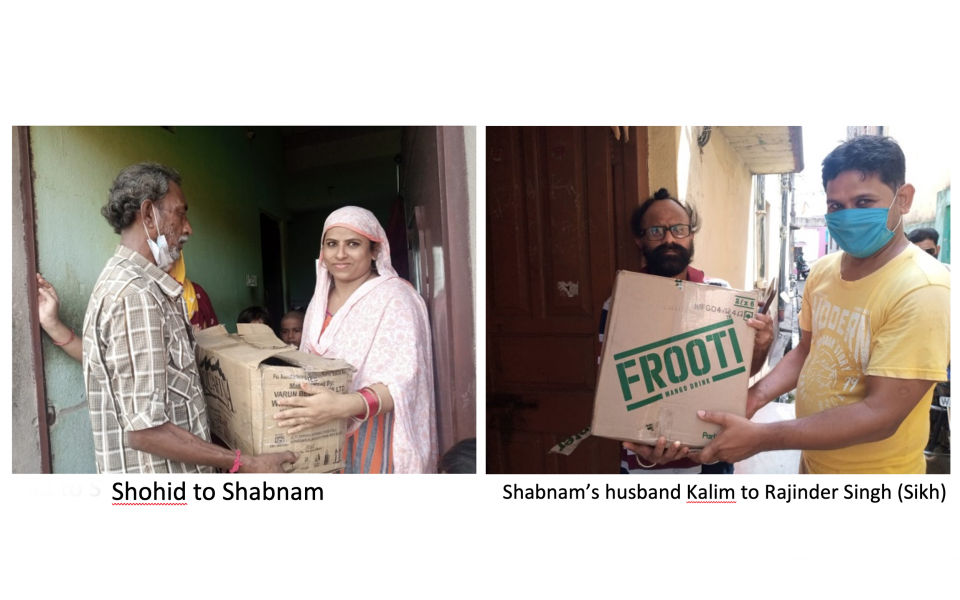
Shohid then took a Basket and explained the Pearls of Compassion project to Shabnam Khatun, a Muslim sister. Shabnam was mother of a family of five. Her husband, Md. Kalim Iqbal, worked in a clothing store which closed down due to Covid. They are uncertain if they will be able to find other work.
Shabnam’s husband took a Grocery Basket to the family of Rajinder Singh, a Sikh. Rajinder, deaf and mute and a vibrant soul nevertheless, engaged with the URI Cooperation Circle volunteers with joy. Rajinder was happy to take a Basket to Gopal Rajak and his Hindu family of six!
This story continues as each pearl shines is its own beauty and together weaves a strong interfaith garland. It is the URI way.
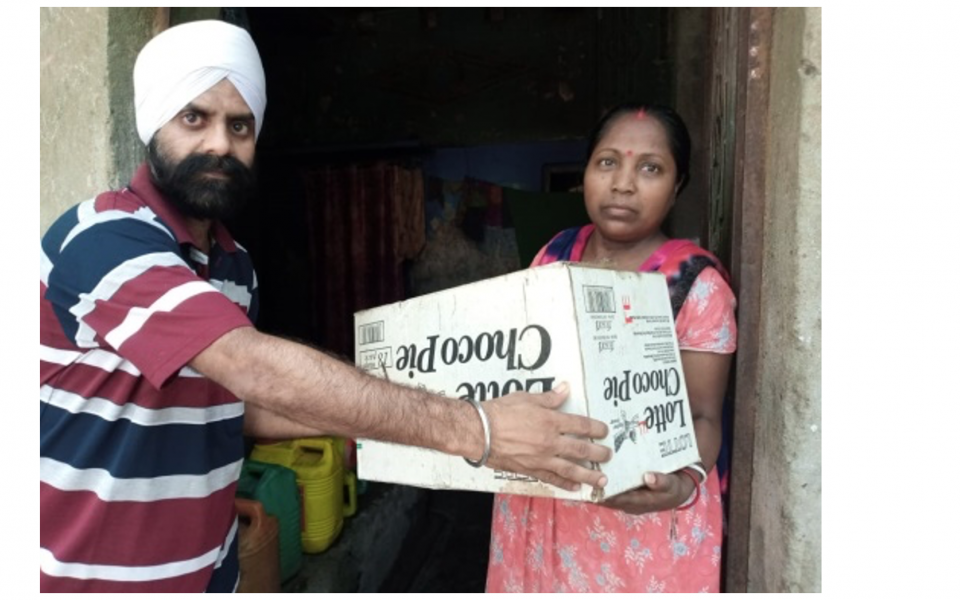
Rajinder Singh brought a Basket to Gopal Rajak’s wife, and then Gopal gave one to a Muslim brother, Md. Naushad.
In the same town, the story continues…
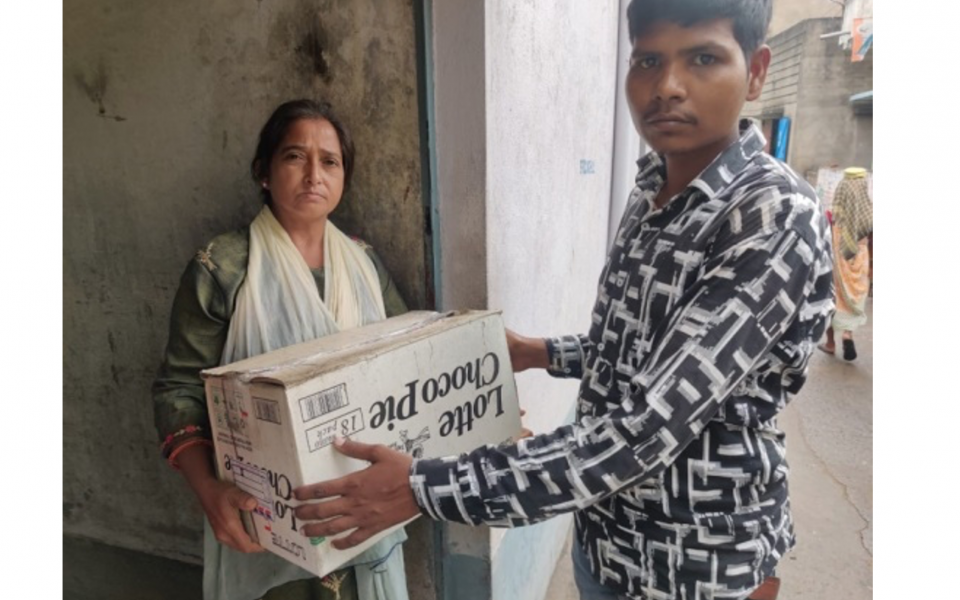
In the City of Asansol (called The City of Brotherhood), Mohammad Naushad delivers a Basket to Pinki Kaur, a Sikh.
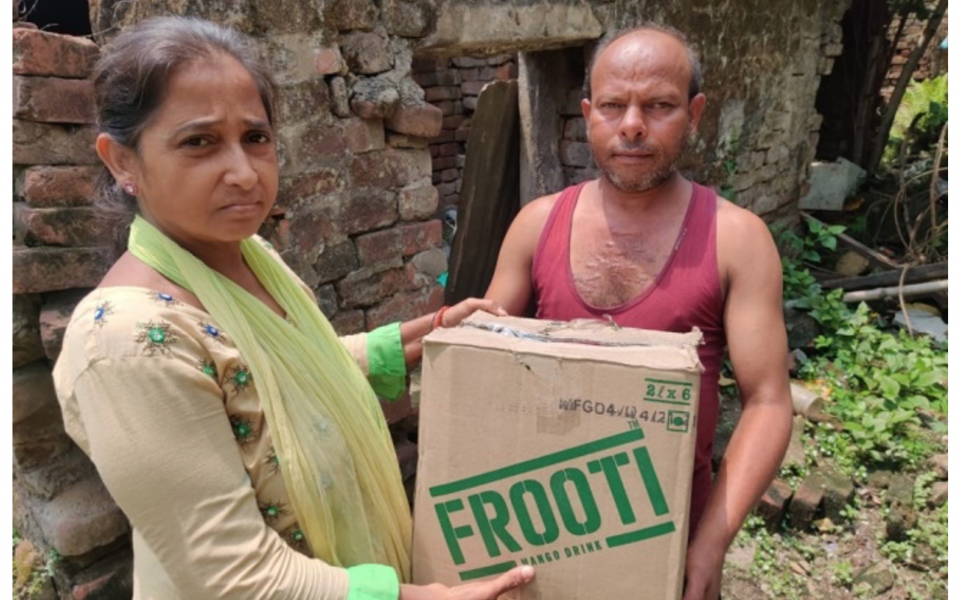
Pinki Kaur delivers a Basket to Firoz, a Muslim.
“I thought I was in great need, but when I saw this man, I wanted to give him my Grocery Basket!”
What ripples will be felt across this vast region? What pearls of compassion for long-lasting change are yet to form?

